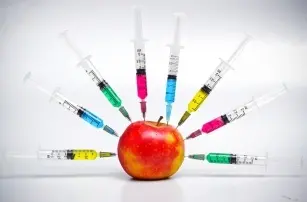Contents

Food additives, among which the most popular are dyes and preservatives, contribute to the deposition of ingredients unfavorable to our health in the body. Nowadays, the suitability for consumption, as well as the taste of food, are often enhanced on a large scale with the use of substances that increase our susceptibility to food allergies and also weaken our physical condition. It is even more dangerous that the daily intake of toxins can be up to 20 grams.
There is a requirement to place information on harmful or allergenic ingredients on the packaging, but we often do not realize what enigmatic-sounding words hide. Let us remember that substances marked with the E symbol become dangerous to our body, especially when we consume them regularly and in excess.
Preservatives
We come across the commonly occurring benzoic acid especially in margarine, carbonated drinks, fruit juices and jellies. Consuming it, we expose ourselves to a rash, as well as irritation of the mucous membrane of the stomach and intestines. For nausea and headaches, we can blame sulphates marked with the symbol E 220 to E 228, which we often come across while consuming wine, fruit juices or canned food. Both E 249 (potassium nitrate) and E 250 (sodium nitrate) are used in the meat curing process, sometimes these ingredients enable the development of carcinogenic lesions. Sulfur dioxide E 220 found in nuts and dried fruits has a negative impact on the condition of the respiratory tract and vocal cords.
Synthetic dyes
Under E 133 there is brilliant blue, often mentioned in the composition of canned vegetables. It has a particularly adverse effect on people with diseases of the digestive system. On the other hand, E 110, the so-called sunset yellow increases the risk of shortness of breath, hives and other allergic reactions. We find it in the composition of tablets, chewing gums and marmalades. Amaranth (E 123) is banned in the United States due to its carcinogenicity, and is also responsible for the deposition of calcium in the kidneys.
Acidifying substances
Common acidifiers are magnesium (E 511), potassium (E 508) and calcium (E 509) chlorides. We can easily find them in the composition of spices. They have a laxative effect and are undesirable for people suffering from kidney or liver diseases. People with a sensitive stomach should not consume acetic acid known as E 260, found in sauces and pickled vegetables.
Flavor enhancers
E 622 – potassium glutamate is widespread in powdered soups and cold cuts. Headaches, shortness of breath and accelerated pulse are just the icing on the cake of its harmfulness. The situation is similar with monosodium glutamate MSG (E 621).
Antioxidants
Sodium tartrates (E 335) and potassium tartrates (E 336) contained in confectionery products may cause laxation.
Emulgatory
Diphosphates known as E 450 can be found in salt and meat products, chips. They increase osteoporosis, slow down metabolism.
Sugar substitutes and thickening and gelling preparations
People with a sensitive digestive system should avoid aspartame (E 951) and saccharin (E 954), which are supposed to replace sugar in many products. Alginic acid (E 400) should primarily be avoided by expectant mothers. Intestinal ulceration is favored by carotene, known under the symbol E 407.









